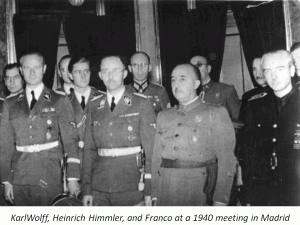Franco and Salazar Meet in Seville
In a series of meetings held February 11-13, 1942, Spanish dictator Francisco Franco and Portuguese President Antonio de Oliveira Salazar discussed ties between their two nations and the ongoing war. Franco was being courted by the Axis Powers especially since German and Italian forces had assisted Franco during Spain’s Civil War. Portugal maintained close ties with Britain and was fearful of a joint Spanish-German invasion from the west.
At the outbreak of World War II, Spain was recovering from its Civil War, and Franco was corresponding often with Hitler and Mussolini. The main topic was delaying Spanish entry into the war because of a lack of necessary provisions. In all his correspondence, Franco affirmed his allegiance to the Axis Cause but stopped short of giving a timeframe for Spanish entry to the War. Mussolini tried to speed Franco’s mobilization in an August 1940 letter:
Ever since the outbreak of the war I have been constantly of the opinion that “your” Spain, the Spain of the Falange Revolution, could not remain neutral until the end of the war, but at the right moment would change to non-belligerency and finally to intervention. Should that not happen, Spain would alienate herself from European history, especially the history of the future, which the two victorious Axis powers will determine.

On February 6, 1941 Spain had not entered the fighting and was still appealing for provisions before mobilizing. Hitler affirmed that he would deliver as much grain as Germany could bear at the moment that Spain entered the war. Hitler stated, “it is clear that, on January 10 if we had been able to cross the Spanish border with the first formations, Gibraltar would today be in our hands.”
Twenty days later, Franco replied to Hitler,
at a time when the Spanish people is suffering the greatest starvation and enduring all sorts of privations and sacrifices, it is not certainly propitious for me to ask further sacrifices of them if my appeal is not preceded by an alleviation of this situation, which at the same time may permit us to carry out beforehand an intelligent propaganda on the constant friendship and effective support of the German people, which will reawaken in the Spaniard the sentiments of sincere friendship and admiration which he has always had for your Nation.
Portugal took the initiative for scheduling the February 11-13, 1942 meetings in Seville. Spain agreed so as to ensure that an Allied landing would not occur in Portugal. The Axis and Allies both watched these meetings carefully, and both sides were heartened by the agreement reached. The Allies felt relieved that Franco had reaffirmed a desire to keep the Iberian Peninsula a “zone of peace.” The Axis were pleased with Portugal’s pledge to neutrality and unwillingness to allow an Allied base on the peninsula.
Franco continued to reaffirm his connection to Germany and Italy while stopping short of joining the war effort. He claimed Germany was the last line of defense against Soviet domination. Before leaving Seville, Franco boasted, “if there were a moment of danger, if the road to Berlin were open, it would not be a Division of Spanish volunteers making their way there, but instead a million Spaniards.” In 1943, following the failed German siege of Stalingrad, Franco declared full neutrality.
This post by Louisiana History Day Coordinator Nathan Huegen
- Posted :
- Post Category :
- Tags :
- Follow responses to this entry through the RSS 2.0 feed. You can skip to the end and leave a response. Pinging is currently not allowed.




Leave a Reply